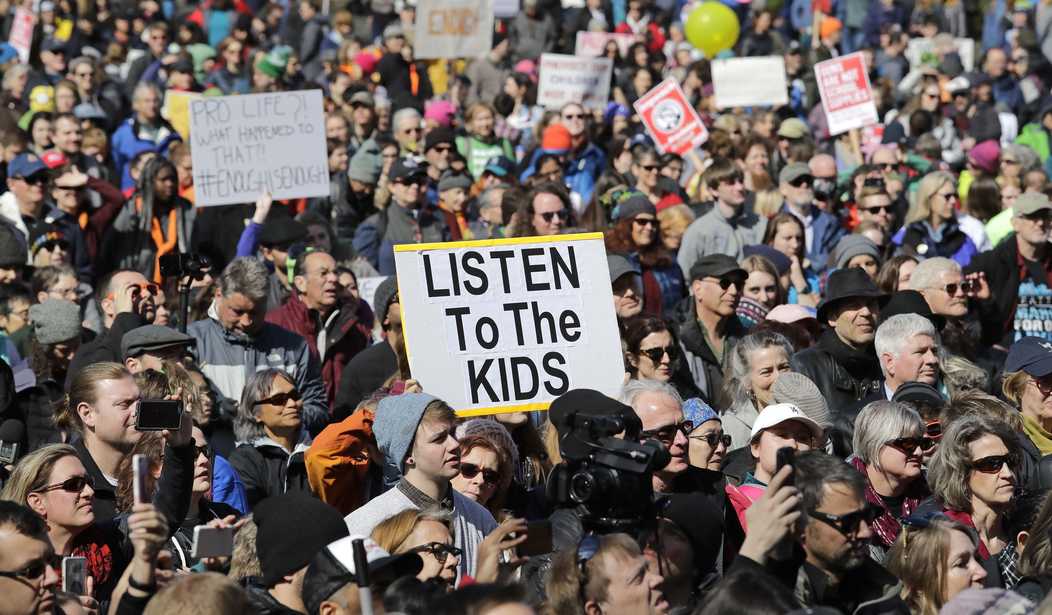What does it say about a society when it begins to seriously debate the need to protect children and one side doesn’t even admit they need protection?
The dangers to children are clearer by the day and — thanks to years of progressive policies and threats of cancelation — are playing out in schools, corporate boardrooms, and via the internet. The fact the debate is so contentious is something many (this writer included) were unprepared to confront.
But children are in danger. Because, in several sectors of modern society, they are being told at an increasingly young age they are broken, confused, and not able to trust their parents.
And it’s showing up in the data. Axios reports that the rate the current generation is identitfying sexually as LGBTQ has soared in comparison to other generations. And it’s not just run-of-the-mill homosexuality.
Respondents were asked if they identify as lesbian, bisexual, transgender, or something other than heterosexual — and could pick as many options as applied to them.
- Those who responded with another identity, like queer or pansexual, were recorded as “other LGBT” and were included in the estimate.
What’s particularly strange about this is that it seems clearly tied in with a political ideology, which suggests that it’s not — as many conservatives have been getting louder about vocalizing — wholly organic. And the purveyors of that ideology seem blissfully unaware. Because if they were aware of the damage they’re causing they pull back, right? Right??
WH’s @PressSec: GOP “legislators who are contemplating these discriminatory [trans] bills have been put on notice by the DoJ & HHS that laws & policies preventing care that health care professionals recommend for transgender minors may violate the Constitution & the federal law" pic.twitter.com/laQvdtXawN
— Tom Elliott (@tomselliott) April 7, 2022
While most are focusing on the disturbing rise of sexual identity discussions by teachers in schools targeting very young children — a trend Florida Governor Ron DeSantis is trying to address with his parental rights bill — there are other threats to America’s young people, notably the political agenda that forced young people away from their peers and into masks for two years.
At Bari Weiss’ Common Sense substack, Suzy Weiss tracks how young people did during the pandemic. Conclusion: not well.
This didn’t start with Covid. “People are growing up more slowly,” said Jean Twenge, a psychologist at San Diego State University and the author of the 2017 book “iGen.” Jonathan Haidt, the psychologist and author of “The Coddling of the American Mind,” traces the downward spiral to 2013 and the explosion of social media. That’s when the helicopter-parented 18-year-olds started to leave home with their iPhones and not much else.
But Covid has dramatically compounded these forces. Being hermetically sealed off from bad dates, bad breakups, awkward conversations, tough teachers and mean bosses has left young people even less capable of navigating the hiccups of daily life.
The CDC said that, from 2019 to 2020, the incidence of girls ages 12 to 17 who were rushed to the Emergency Room after attempting suicide jumped by 51 percent. E.R. admissions for eating disorders doubled among the same group, according to the CDC, and tripled for tic-related disorders, which experts trace in part to TikTok. (During roughly the same period, the overall U.S. suicide rate, which skews heavily male, dropped by about 3 percent.)
One young girl Weiss interviewed mentioned that she didn’t even have the energy to make TikTok videos, providing some insight into how popular that platform has become for young people.
Recently, I spoke with Serena. She’d spent the previous few days in bed watching “Euphoria” and “Shameless.” The week before, she’d tested positive for Covid for the second time. “Monday I had a brutal headache for about four hours,” Serena told me. Her mom left sandwiches, ibuprofen, and vitamins at the bottom of the stairs. “I didn’t have any energy to do my hair or make TikToks or anything.”
TikTok, in addition to its disturbing ties to the Chinese Communist Party, has also been playing pharmacy it seems to these same kids who might find themselves confused by the sheer panoply of sexual identies available — and pushed — on them.
Each mental illness you plug into the [TikTok] search bar has its own little community of sufferers who post their travails on the platform. Some of them really seem to be mentally ill. Others do not. Many of the supposed sufferers self-diagnose with bipolar or borderline personality disorder—relatively rare and serious conditions.
Kyle Robertson is the co-founder of the mental-health startup Cerebral. His company provides customers with direct-to-door prescription psychiatric medication. It also runs its own TikTok account, where it promotes “medication management for anxiety, depression, insomnia [and] more.” It has several paid “influencers” who post promotional spots on the site with the hashtag #cerebralpartner. It even brought on Olympic gymnast Simone Biles as a “chief impact officer.”
Plugging SSRIs on TikTok is a little like selling OxyContin outside of a rehab facility. It may be evil, but you marvel at the gall.
In short, the kids are not all right. Progressive policies and political agendas have failed them. And conservatives should be doing everything in their power to save them. The first step, of course, is admitting the problem. That’s where conservatives have the advantage.













Join the conversation as a VIP Member